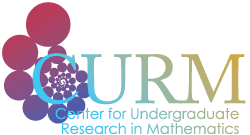Center for Undergraduate Research in Mathematics Minigrants
- Summer workshop 2025: The workshop for the upcoming granting period will be in New Orleans the week of June 2, 2025 (workshop location).
Application deadline is December 15 of each year beginning in 2023. The Summer Faculty Training Workshop will be held in person starting in 2024 — all minigrant recipients are expected to attend. Notifications of award are typically sent by early February.
The Center for Undergraduate Research in Mathematics (CURM) is an NSF-funded program that provides funding and training for academic-year undergraduate research groups in mathematics. CURM has supported more than 300 faculty and 1000 students across the US for more than 15 years. CURM research groups are collaborations between faculty and students at two institutions, one that is a Bachelor’s-granting institution, and one that is a 2-year or community college. CURM components are below.
Minigrants
- Faculty partners mentor collaborative course-based undergraduate research groups between a 4+year institution and a 2-year or community college for students in their first or second year of college
- $7000 stipend for course release for each faculty member
- Funding for supplies and travel
- Course credit for students (or a stipend, in exceptional circumstances)
Professional Development
- Optional fall workshop on proposal development for writing competitive proposals
- Required summer faculty workshop with training in:
- Research topics and tools appropriate for early career students
- Data Science
- Discrete Math
- Math Modeling
- Math Ed
- Effective collaboration
- Research mentoring for diverse early career students
- Research topics and tools appropriate for early career students
Deliverables
- Research course for early career students
- Spring research presentation at a local conference
- End of year paper
- Give Back activity to support others in math
About CURM:
The basic components of CURM are:
- Training professors as mentors for undergraduate students doing research;
- Advising professors on how to maintain undergraduate research groups at their institutions;
- Fostering connections to the broader mathematical community through cross-institution partnerships, regional networks, and community engagement requirements;
- Preparing undergraduate students to succeed in their future studies and careers in the mathematical sciences;
- Revitalizing faculty research programs.
Founded in 2007 by Michael Dorff at BYU, CURM has had tremendous success in promoting academic year undergraduate research in the mathematical sciences. Since its inception, CURM has provided financial support to undergraduate students mentored by professors from over 100 universities and colleges nationwide. During that time, CURM students have written hundreds of joint research papers. In addition, the students have given hundreds of single/joint conference presentations or poster presentations, and have received multiple awards for their presentations or research. Finally, data shows that at institutions participating in the CURM program up to 2023, 63% of the CURM students go on to graduate school while only about 18% of the total math majors at these schools do so. For these reasons and others, CURM received the 2015 Programs that Make a Difference award from the American Mathematical Society.
CURM has been funded by the National Science Foundation DMS awards 0636648, 1148695, 1722563. The current award is DMS-2317453. We are extremely grateful for this support!
Contact: Kathryn Leonard, kleonardci@gmail.com
